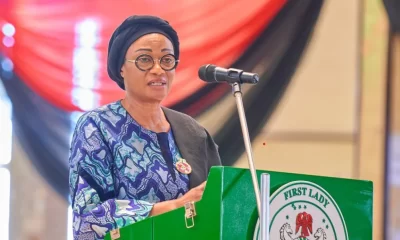Financial experts have commended the decision of the Monetary Policy Committee (MPC) over the reduction in the benchmark rate, saying it signaled a new economic direction for the country.
The experts, who gave the commendation in a separate interviews on Tuesday in Lagos, said it was the right thing to do now that the election was over.
The Monetary Policy Committee (MPC) of the Central Bank of Nigeria (CBN) on Tuesday cut the benchmark lending rate from 14 per cent to 13.5 per cent to further promote economic growth.
The Central Bank Governor, Mr. Godwin Emefiele said this when he briefed newsmen in Abuja on Tuesday on the outcome of the 266th Monetary Policy Committee meeting.
This is the first time the rate has been altered since July 2016.
Dr. Boniface Chizea, an economist, said the reduction in the Monetary Policy Rate (MPR) from 14 per cent to 13.5 per cent would boost economic activities and increase productivity in the country.
Chizea, Chief Executive Officer, BIC Consultancy Services, said the Monetary Policy Committee (MPC) decision was a wise one because the inflation rate at 11.31 per cent was dropping.
Chizea said apart from the decline in the inflation rate, the country had recorded positive growth in the Gross Domestic Product (GDP) standing at 1.92 per cent in 2018 with a forecast of three per cent increase as well as accumulated foreign exchange reserves and oil price improvement.
He said: “So, there is every reason for the benchmark rate to come down. Even, the inflow of funds coming from overseas to the country is on the increase as investors are coming in.
On the effect of the reduced benchmark rate on banks’ interest rates and with the declining inflation rate, Chizea said that might not show immediately.
“What is most important is that psychologically, the central bank has spoken and they have told the whole world that things are getting better,” he said.
The former banker said that the reduced interest would significantly make borrowing cheaper.
“It means that those economic agents on the margin that have problems with the 14 per cent should now be able to borrow. If that happens, they may now give a boost to economic activities in the country,” he added.
Also, Mr. Johnson Chukwu, Managing Director of Cowry Assets Ltd., said the reduction in benchmark rate was an indication that the monetary policy committee had moved from its contractionary stance to accommodative induced one.
According to him, the monetary authority’s decision emphasised an economic growth as against price stability.
Chukwu said: “If the inflation rate is 11.31 per cent and the monetary policy rate is 13.35 per cent, the reality is that we are still going to enjoy what is called positive yield income because the interest rate is higher than the inflation rate.
Meanwhile, governor of the CBN, Godwin Emefiele, on Tuesday explained that two members voted to reduce the MPR by 25 basis point, another two members voted to hold the MPR at 14 per cent while one member voted to reduce it by 100 basis point.
He also said that 10 members voted to hold all other parameters at the present rate, while only one member voted to reduce the cash reserve ratio.
To this effect, he said the Cash Reserves Ratio (CRR) remain unchanged at 22.5 per cent, liquidity at 30 per cent and Asymmetric corridor at +200 and -500 basis points around the MPR.

 Entertainment6 days ago
Entertainment6 days ago
 Entertainment3 days ago
Entertainment3 days ago
 Comments and Issues6 days ago
Comments and Issues6 days ago
 Business7 days ago
Business7 days ago
 Comments and Issues6 days ago
Comments and Issues6 days ago
 Health1 week ago
Health1 week ago
 Editorial Opinion1 week ago
Editorial Opinion1 week ago
 Comments and Issues6 days ago
Comments and Issues6 days ago

